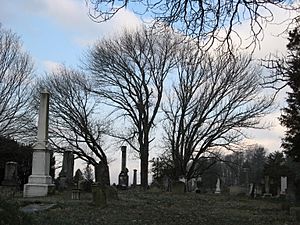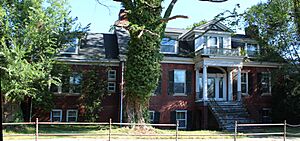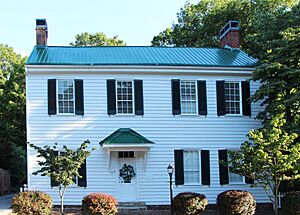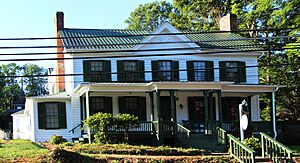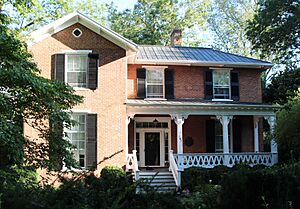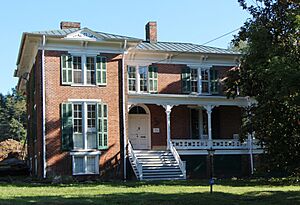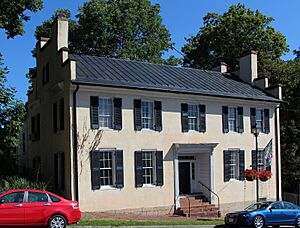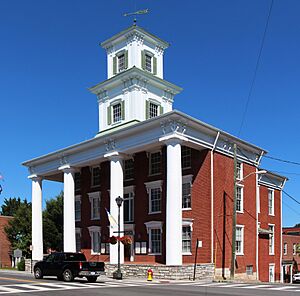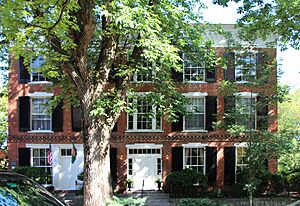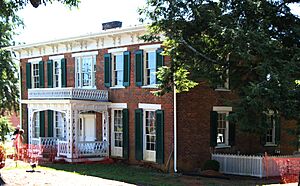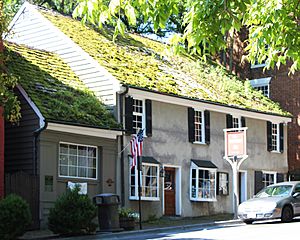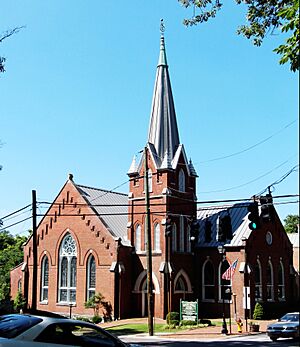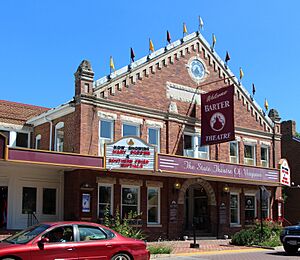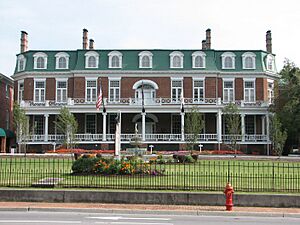Abingdon Historic District facts for kids
|
Abingdon Historic District
|
|
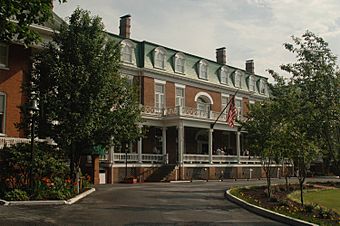
Martha Washington Inn, June 2007
|
|
| Location | Both sides of Main St. between Cummings and Deadmore Sts.; Roughly bounded by Russell Rd. and Jackson St., Whites Mill Rd., E. Main and E. Park and W. Main Sts., and Academy Dr., Abingdon, Virginia |
|---|---|
| Area | 159.5 acres (64.5 ha) |
| Built | 1778 |
| Architectural style | Colonial Revival, Bungalow/craftsman, Queen Anne |
| NRHP reference No. | 70000831, 86002193 (Boundary Increase) |
Quick facts for kids Significant dates |
|
| Added to NRHP | February 26, 1970, September 17, 1986 (Boundary Increase) |
The Abingdon Historic District is a special area in Abingdon, Virginia, where many old and important buildings are protected. It's like a big outdoor museum! This district helps keep the history of Abingdon alive.
It covers about 159.5 acres and includes 145 buildings. There are also two historic sites and 13 other structures. These buildings show different styles from the late 1700s to the mid-1900s. The district was added to the National Register of Historic Places in 1970. This means it's recognized as a very important historical place in the United States.
Contents
Exploring Abingdon's Historic Buildings
Let's take a closer look at some of the cool buildings you can find here. Each one has its own story!
The Oldest Homes
Some of the oldest houses in the district are found on Valley Street. They show how people lived long ago.
Alexander Findlay House
The Alexander Findlay House was built in 1827. It is the oldest house still standing on Valley Street. It shows the "Federal" style of architecture.
Gabriel Stickley House
The Gabriel Stickley House was built around 1830. It is another one of the oldest homes on Valley Street. It also features the Federal style.
Daniel Trigg House
This house was built in the early to mid-1800s. It shows a simpler, "Vernacular" style. It's a good example of how middle-class families lived in the mid-1800s.
Homes of Prosperity
After the Civil War, some houses on Valley Street became very "fashionable." They showed that people were doing well.
Daniel Musser House
The Daniel Musser House was built in 1869. It has an "Italianate" style, which was popular then. This house was a sign of wealth after the war.
David G. Thomas House
Built in the 1870s, this house is another example of the Italianate style. Like the Musser House, it showed the prosperity of the time.
Important Public Buildings
Dr. William H. Pitts House
The Dr. William H. Pitts House was built in 1854. It has a "Greek Revival" style. What makes it special is its stucco walls, which are rare in Abingdon. It was added to the National Register of Historic Places in 2002.
Washington County Courthouse
The current Washington County Courthouse was built in 1868. It has strong Greek Doric columns. It also features an Italianate style tower. This building replaced an earlier one that burned during the Civil War.
Abingdon Bank
The Abingdon Bank building was built around 1845. It mixes "Greek Revival" and "Late Victorian" styles. It used to have a bank on one side and a home for the bank's cashier on the other.
Fields-Penn House
The Fields-Penn House was built in 1860. It shows "Georgian" proportions with "Greek Revival" details. Today, it is a museum called the Fields-Penn 1860 House. It teaches visitors about life in the 1860s.
Historic Gathering Places
The Tavern
Built in 1779, The Tavern is the oldest building in Abingdon! Over the years, it has been many things. It was a bank, a bakery, a store, and even a hospital during the Civil War. Today, it is a restaurant.
Sinking Spring Presbyterian Church
This church was built in 1851 in the "Greek Revival" style. The first Presbyterian church in the area was a log building from the early 1700s. The congregation moved a few times before settling here.
Barter Theatre
The Barter Theatre opened on June 10, 1933. It is one of the oldest professional theaters in the United States. During the Great Depression, people often paid for tickets with food instead of money. This is how it got its name, "Barter"!
Martha Washington Inn
The Martha Washington Inn was built in 1832. It was first a large home for General Francis Preston and his family. Later, in 1858, it became a college for young women. During the Civil War, it was used as a hospital for wounded soldiers. In 1935, it opened as a hotel.
Images for kids
 | James Van Der Zee |
 | Alma Thomas |
 | Ellis Wilson |
 | Margaret Taylor-Burroughs |




